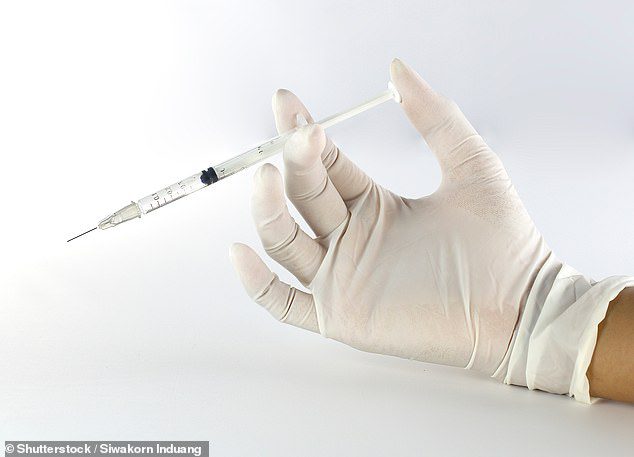An injection which halts the onset of Alzheimer’s could be available within ten years, experts have predicted.
The Alzheimer’s Society said recent breakthroughs for the memory-robbing disorder have led scientists to a ‘tipping point’.
The injection would work by muting genes that play a role in the disease developing, according to the charity.

The injection would work by muting genes that play a role in the disease developing. Scientists know of 25 genes which significantly increase a person’s risk of Alzheimer’s
A similar approach has already shown ‘remarkable’ results in trials for children with a rare spinal condition.
There are currently around 850,000 people in the UK living with some form of dementia, of which there is no cure.
Figures show there are around 5.7million patients battling Alzheimer’s – the most common form – in the US.
‘There is going to be a leap of faith moment,’ Dr. James Pickett, head of research at the Alzheimer’s Society, told The Telegraph.
‘There are lots of different pieces of the puzzle coming together.
‘We’ve got all of this genetic knowledge as cancer researchers did 30 years ago, and we’re now investing in understanding it and exploiting it.’
For decades, researchers have based developing treatment on targeting damaging proteins that build up in the brain.
However, decades worth of studies have failed to find a solution.
The injection would work by silencing specific genes already known to play a role in the disease developing.
Scientists now know of more than two dozen genes which significantly increase the risk of Alzheimer’s, up from just one in 2012.
By using CRISPR gene editing technology, researchers believe the expression and communication of these genes could be manipulated.
This would allow scientists to regulate the activity of the accumulation of proteins such as tau, heavily linked to Alzheimer’s, in the brain.
Children suffering from spinal muscular atrophy have benefited from being given the gene editing treatment in a medical trial.
People with Huntington disease have also shown promising results after a gene therapy trial at University College London.
‘What we learn from one disease we can take on to another,’ said Dr. Pickett. ‘2019 is a tipping point for dementia gene therapy.’
He said the priority should be to attract CRISPR scientists currently working on the technology in other fields, such as fertility.
The most important risk factor for Alzheimer’s disease is age, and it is most common in people in their late 70s and 80s.
Dr. Pickett said preventative treatments for this kind of Alzheimer’s remain ‘further away.
Around one in 14 over the age of 65 will develop the disease, with one in six over the age of 80.
If you know someone who might like this, please click “Share”!




